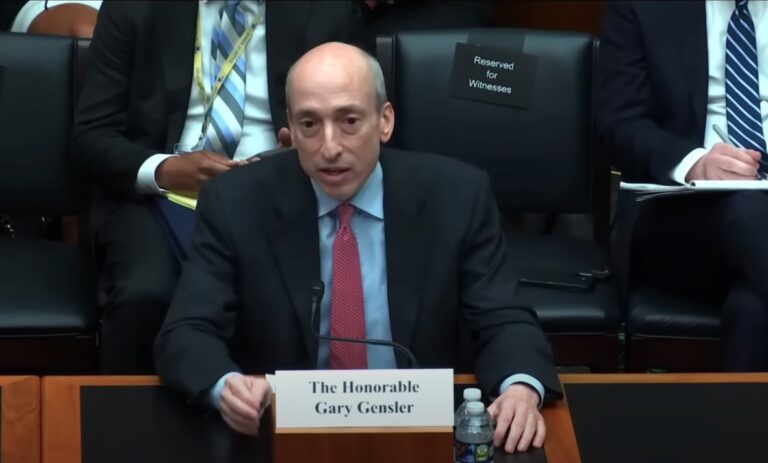Yesterday, in a detailed analysis on his YouTube channel, Crypto Jebb, a notable figure in the cryptocurrency analysis sphere, discussed the potential impact of the U.S. Securities and Exchange Commission (SEC) rejecting all current applications for spot Bitcoin ETFs. He specifically focused on the influence of SEC Chair Gary Gensler’s stance on the future of Bitcoin’s price.
Jebb’s analysis is centered around the significant influence that the SEC’s decision could have on the price of Bitcoin, which he fears could plummet from its current level of around $37,000 to as low as $8,000.
Jebb begins by discussing the recent surge in Bitcoin’s price, attributing it to market speculation around the approval of Bitcoin ETFs. He notes that the price of Bitcoin had risen from $25,000 to over $35,000 on the back of this speculation. This rise underscores the market’s sensitivity to developments related to Bitcoin ETFs.
Focusing on BlackRock’s spot Bitcoin ETF application, Jebb points out that its approval or rejection by the SEC is pivotal. The deadline for this decision is March 15th, closely preceding the anticipated Bitcoin halving in early April. Jebb warns that a rejection of this application and others could lead to a dramatic market crash, potentially reducing Bitcoin’s value significantly.
Jebb then introduces the concept of the “Gensler Dilemma.” This dilemma refers to Gensler’s apparent fear of approving products that might lead to market manipulation or significant losses for investors, reflecting poorly on his tenure as the SEC Chair. Jebb suggests that Gensler’s cautious approach to Bitcoin ETFs, driven by his fear of negative outcomes, might ironically result in the very market destabilization he aims to prevent.
He further argues that if the ETFs are denied, it could not only trigger a market crash but also adversely affect Gensler’s legacy in the cryptocurrency space. Jebb questions whether Gensler is aware of the potential impact of his decisions on the market and his reputation. He emphasizes the importance of Gensler recognizing this dilemma and the implications of his actions regarding the approval of Bitcoin ETFs.
https://youtube.com/watch?v=8czLZFd_LFU%3Ffeature%3Doembed
However, if the SEC approves at least one spot Bitcoin ETF in the U.S., Jebb expects a very different future for Bitcoin.
As CryptoGlobe reported around three weeks ago, back then, Jebb offered a detailed analysis on Bitcoin’s potential for a significant rally, predicting it could surpass $70,000 by next year’s end. He based this optimistic forecast on two pivotal factors: the initiatives of BlackRock, the world’s largest asset manager, and the monetary policies of the Federal Reserve.
He revisited the 2020-2021 bull market, attributing its momentum to the pandemic and the Federal Reserve’s quantitative easing (QE) program. This program, involving the purchase of treasuries and mortgage-backed securities, injected liquidity into the U.S. economy. Jebb noted that this led to increased cash flow in the retail sector as people, buoyed by stimulus checks, began investing in Bitcoin. Additionally, he pointed out that the era’s low-interest rates spurred borrowing for Bitcoin investment, aiding its surge from $20,000 to $69,000.
Jebb also discussed BlackRock CEO Larry Fink’s evolving perspective on Bitcoin. Initially skeptical, Fink’s stance has shifted, with BlackRock moving to launch a spot Bitcoin ETF. Jebb sees this as a pivotal development, making Bitcoin more accessible to the average American and their financial advisors. He anticipates this could lead to an enormous influx of capital into Bitcoin, potentially in the hundreds of billions or even trillions, within the ETF’s first year. This, he argues, would cement Bitcoin’s status as a viable long-term investment, quieting critics.
Regarding the Federal Reserve’s policies, Jebb believes they have been crucial in Bitcoin’s past performance and will remain influential. The Fed has begun quantitative tightening and set the federal funds rate at 5.25%. Jebb anticipates a future reduction in interest rates and a possible QE reintroduction, particularly if rolling recessions occur. These measures, he argues, would act as a catalyst for Bitcoin’s growth, potentially driving it to new record highs.
https://youtube.com/watch?v=di6WMM5b0ic%3Ffeature%3Doembed
Source: Read Full Article
